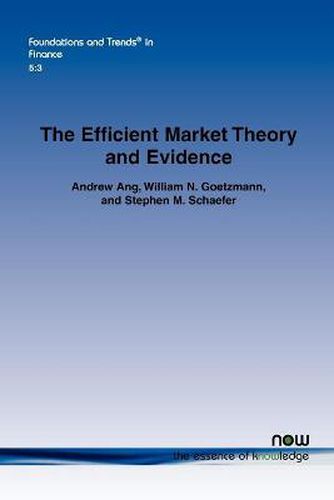Readings Newsletter
Become a Readings Member to make your shopping experience even easier.
Sign in or sign up for free!
You’re not far away from qualifying for FREE standard shipping within Australia
You’ve qualified for FREE standard shipping within Australia
The cart is loading…






This title is printed to order. This book may have been self-published. If so, we cannot guarantee the quality of the content. In the main most books will have gone through the editing process however some may not. We therefore suggest that you be aware of this before ordering this book. If in doubt check either the author or publisher’s details as we are unable to accept any returns unless they are faulty. Please contact us if you have any questions.
The efficient market theory asserts that the price of a security reflects all available information about its fundamental value. A consequence of the theory is that it is impossible to consistently beat the market and speculation must be a loser’s game. Hence, an indexing strategy is bound to eventually beat a strategy that uses active management; where active management is characterized as trading that seeks to exploit mispriced assets.
The Efficient Market Theory and Evidence reviews the extensive theoretical and empirical literature on the efficient markets hypothesis (EMH). The authors base their review on the implications of the EMH for the practice of active investment management. Beginning with a brief discussion of current efficient market theory, the authors present the theoretical foundation and discuss the recent empirical evidence on efficiency as it pertains to a range of different markets - not simply the large, liquid public securities markets but also the private capital markets.
The book suggests that while tests of the theory on prices have produced violations suggestive of the potential for active management to add value to a multi-asset portfolio, but finding consistent out-performing active managers is difficult. Since the most recent versions of the EMH emphasize the comparative advantages of specialized arbitrageurs due to better information, skill, lower trading costs, and better access to financing, the balance between indexation and active management is a choice that depends on beliefs about the existence and potential of manager skill, the pricing opportunities afforded within a given market, the time preferences and risk aversion of the investor.
$9.00 standard shipping within Australia
FREE standard shipping within Australia for orders over $100.00
Express & International shipping calculated at checkout
This title is printed to order. This book may have been self-published. If so, we cannot guarantee the quality of the content. In the main most books will have gone through the editing process however some may not. We therefore suggest that you be aware of this before ordering this book. If in doubt check either the author or publisher’s details as we are unable to accept any returns unless they are faulty. Please contact us if you have any questions.
The efficient market theory asserts that the price of a security reflects all available information about its fundamental value. A consequence of the theory is that it is impossible to consistently beat the market and speculation must be a loser’s game. Hence, an indexing strategy is bound to eventually beat a strategy that uses active management; where active management is characterized as trading that seeks to exploit mispriced assets.
The Efficient Market Theory and Evidence reviews the extensive theoretical and empirical literature on the efficient markets hypothesis (EMH). The authors base their review on the implications of the EMH for the practice of active investment management. Beginning with a brief discussion of current efficient market theory, the authors present the theoretical foundation and discuss the recent empirical evidence on efficiency as it pertains to a range of different markets - not simply the large, liquid public securities markets but also the private capital markets.
The book suggests that while tests of the theory on prices have produced violations suggestive of the potential for active management to add value to a multi-asset portfolio, but finding consistent out-performing active managers is difficult. Since the most recent versions of the EMH emphasize the comparative advantages of specialized arbitrageurs due to better information, skill, lower trading costs, and better access to financing, the balance between indexation and active management is a choice that depends on beliefs about the existence and potential of manager skill, the pricing opportunities afforded within a given market, the time preferences and risk aversion of the investor.